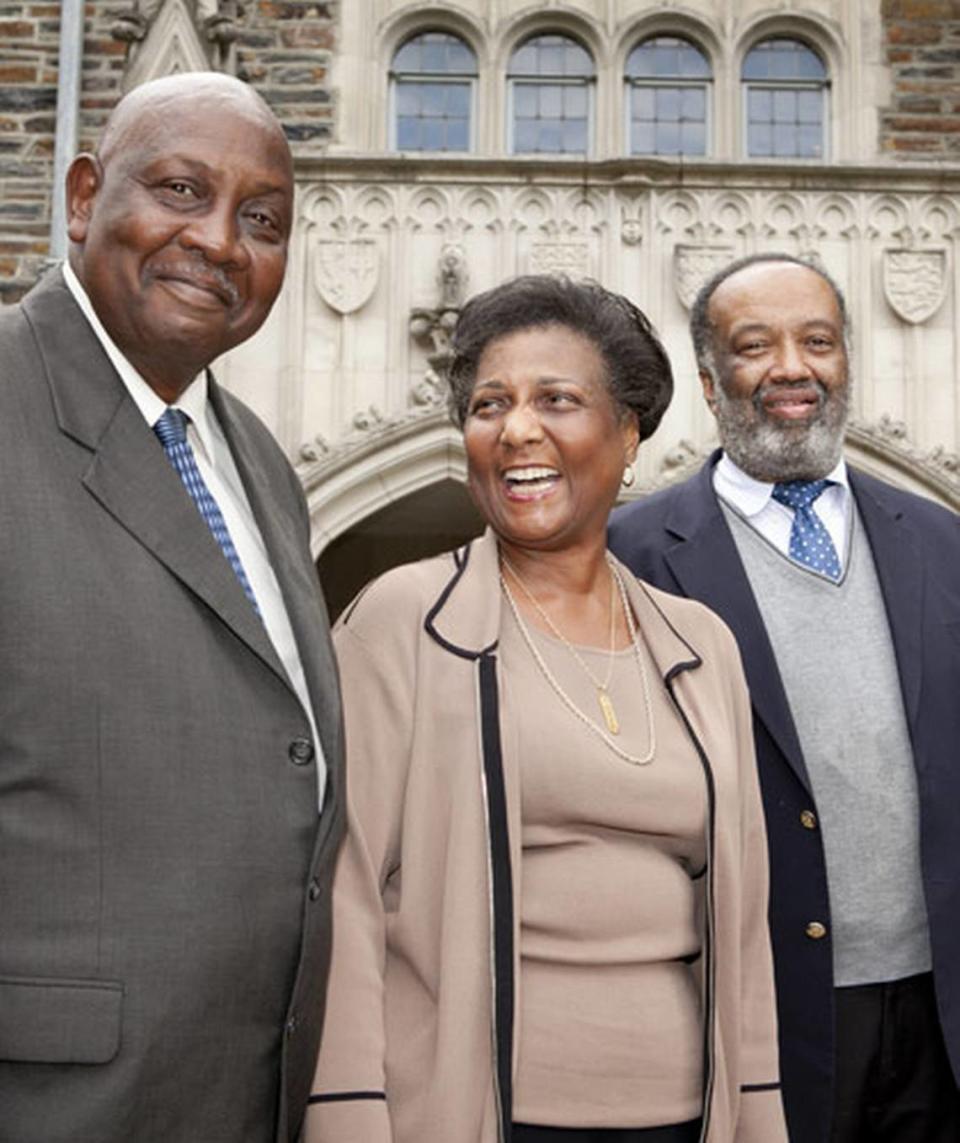Duke names campus union for father-son custodians, who endured slavery and discrimination
George Frank Wall never knew his exact age because the family Bible burned in a house fire, but from the time he was old enough to handle a broom, he swept the floors at Duke University.
He kept that custodian’s job until he was a white-haired old man, making beds, keeping the kitchen neat, boasting that he’d only been sick for two days in his life. He never had much schooling himself, and he signed his name with a hyphen — often enough that “hyphen” became his nickname.
Then, before he died in 1952, Wall set aside a gift for his employer, the university he was barred from attending, leaving $100 collected from his pay. By today’s standard, his generosity totals $1,685.42 — a sizable bite from a Black custodian’s wallet in segregated Durham.
“For 75 years I have been employed by said institution,” read his statement at the time, “and never a cross word, but Christian harmony.”
Last week, Duke announced it will rename East Campus Union after Wall and his father George, also a Duke custodian, recognizing “the important role they played, and that generations of housekeeping and dining staff members have played, in nurturing our campus community and creating a supportive environment for students throughout Duke’s history.”
But in doing so, the university not only honors two men who did its literal dirty work, it allows for a look at their lives as more than happy servants, as they were long portrayed.
At the time of Wall’s $100 gift, news coverage painted him as grateful just to brush up against the academic grandeur he saw at arm’s length, never missing a day at work, toiling well into his 70s. The statement Wall almost certainly did not write for the Durham Herald-Sun in 1946 stressed his desire “to impress on other colored men the fine and good relations between Christian white men and Christian Negroes.”
A fuller depiction of the Walls and Duke’s other housekeepers of their era, including one student’s violent attack on a janitor, is emerging in the ongoing history called, “The Matilda Project: A History of Slavery, Freedom, and Segregation from Trinity College to Duke University.”
“We insist on telling the Wall story as a struggle against white supremacy, not as a story of broom pushers happy to serve,” said Duke history and law professor Thavolia Glymph in an email to The N&O. “Wall and other janitors encountered a great deal of racism and paternalism on campus, which we make clear in our profile of the Walls and other black janitors. We note the stereotypes and resist the tendency to make Trinity College and Duke the sum of the Walls’ lives, which they were not.”
The elder George Wall started life as a slave in Randolph County, and his enslaved mother took the name of the man who owned them. Freed after the Civil War, Wall’s family struggled to transition and bound him out as an apprentice farm laborer. Eventually, he wound up in service to Braxton Craven, president of what was then Trinity College.
When Trinity moved to Durham to become Duke, Wall followed, loading all of the college’s possessions inside a single rail car. His eldest child of 9, who would one day bequeath $100, was already working at his father’s side. As an elderly man, the younger Wall wore a patch on his sleeve that said “Duke University, 1892,” marking his long tenure.
The family’s early years in Durham are unclear, but in 1906, he and his wife Hattie bought the first plot of land in what would become Walltown, the historically Black neighborhood. In the beginning, Walltown would house workers from both Duke and Durham’s tobacco mills. Then it would grow into a seat for activists challenging the city’s segregation.
But neither Wall lived long enough to see that goal achieved. George Frank Wall continued cleaning at Duke more than 20 years after his father died in 1930. He gained enough notice as the university’s oldest employee that newspapers around the state printed his picture in 1950 alongside a story that noted his constant smile and “Yes, sir” greeting, which it quoted as “Yes suh.”
“It was not that George Wall or his son “loved” their jobs in the way this continues to be described and even held up as an honorable thing,” Glymph said, “but that white supremacy required much accommodation from the Black people, including Durham’s Black middle class.”
Thinking of his $100 donation, former Durham Councilman and city historian Eddie Davis called Wall’s gift symbolic — “even though Duke had many more hundred of dollars than he did.”
“I guess just kind of like lots of African-Americans who had ambition and other kinds of aspirations beyond doing menial jobs, it appears that Mr. Wall seemingly had all kinds of things he wanted to do for himself and the community,” Davis said. “Working at an institute of higher learning was about as close as he could get to it at that point.”

In recent years, and in a similar vein, Duke has also renamed the Sociology-Psychology Building on West Campus for its late trustee Wilhelmina Reuben-Cooke, one of its first five Black undergraduates. Duke was among the last major schools in the South to desegregate, admitting Reuben-Cooke in 1963.
In 2016, it granted the University Medal to Oscar Dantzler, the longtime custodian at Duke Chapel, who tended to the university’s centerpiece and had the habit of greeting former Gov. Terry Sanford each morning in the crypt where Sanford resides.

“This has got to be the first time a housekeeper ever got this medal,” Dantzler said at the time. “But I can go out to that bus stop and everybody out there knows my first name. That’s the ultimate honor.”
And now the Walls will hear their own name spoken out loud at Duke — this time by people they’re not obligated to answer.

